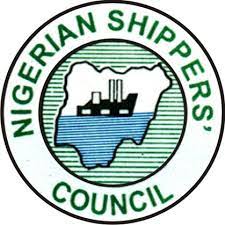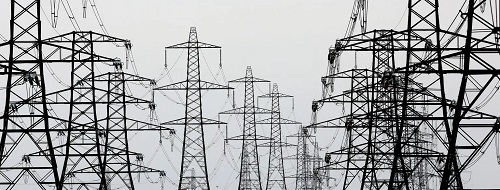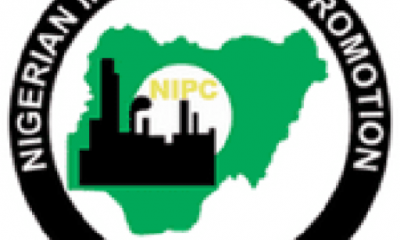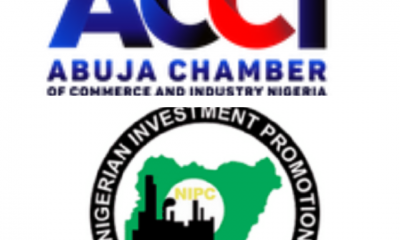BUSINESS
NIPC Attracts US$23.30bn Investments in 2021

By Tony Obiechina, Abuja
The Nigerian Investment Promotion Commission (NIPC) attracted investments valued at US$23.30 billion into the country in 2021, the Acting Executive Secretary/Chief Executive Officer (CEO),
Mr Emeka Offor has disclosed.
Mr Offor who made the disclosure at a media briefing in Abuja on Wednesday, said the figure represents about 39 percent increase in value over the US$16.
74 billion investments tracked the previous year.According to him, “the increase in value is indicative of the growing adaptation to the global ‘new normal’ after the economic disruption occasioned by the restrictions imposed to check the spread of COVID-19 pandemic.
It also indicates the growing confidence of investors in the efforts to improve the national investment landscape”.Giving the breakdown, the Executive Secretary said the top five States, by value of investments, are Lagos (US$8.7 billion); Bayelsa (US$3.6 billion), Delta (US$2.9 billion), Akwa Ibom (US$2 billion), and Adamawa (US$1 billion).
He also stated that the manufacturing sector had the highest number of projects (20) as well as the highest value, US$10.5 billion (45%). Construction (16%), electricity, gas, steam and air conditioning supply (13%), information and communication (12%), and mining and quarrying (9%) made up the top 5 sectors for the year.
On NIPC’s Strategic Plan (2022 – 2026), Mr Offor said, in setting an agenda for the Commission, “we have begun the process of developing a strategic plan with a focus on the NDP sectors. Critical to this strategy is the profiling of the opportunities in each State as well as sustaining the engagements with the sub-national governments.
“We would continue to build on past successes while we chart new paths for sustainable development of the capacity of staff of the State Investment Promotion Agencies while also stimulating healthy competition for investments across the regions and the States.
“We would leverage on our relationships with the Executive of the States to ensure sustained appreciation of the issues of the business environment with the understanding that the aggregation of the sub-national perception forms the national image, and also expand the coverage of Nigerian Investment Certification Programme for States (NICPS)”.
He pointed out that during the plan period, the Commission would aim at completing the reform process it initiated on the process and administrative framework of the Pioneer Status Incentive under the Industrial Development (Income Tax Relief) Act, adding that it will also undertake the review of the qualifying list to include emerging activities that require government support while delisting activities that are matured.
“In line with the e-government initiative, the Commission launched the e-OSIC under the Single Window Investors’ Portal (SWIP). The prevailing global business environment has made it imperative for organisations, such as us, to adopt technology as part of their operational tools.
“Consequently, we would aim at completing the three other modules by the end of Q3 2022 while also transiting the internal operations of the Commission into an electronic document management system”.
He further disclosed that in 2022, “it is expected that there would be some marginal upward flow in global FDI as long as the world sustains the rate of adaptation to the ‘new normal’, governments further relax the restrictions and allow a freer cross borders movement while enforcing social distancing and intensifying campaigns for vaccination coverage as well as improving therapies to bring local transmission of COVID to tolerable levels across the world.
He noted that Africa’s stock, as an investment destination, is expected to sustain its momentum in 2022, given the improving valuation of the continent, its urbanization drift, demographic structure and expected growth in intra-trade activities facilitated by the African Continental Free Trade Agreement (AfCFTA) are strong parameters that would continue to attract investors across the world.
Mr Offor who stressed that work for NIPC in the next five years has been appropriately defined by the National Development Plan 2021 – 2022 (NDP), said the Plan has projected a capital requirement of N348.7 trillion with 86% (N298.3 trillion) expected to be provided by the private sector.
BUSINESS
Subsidy Removal: Tinubu Kept his Campaign Promise – Akutah

Executive Secretary/CEO, Nigerian Shippers Council (NSC), Pius Akuta said President Bola Tinubu kept to his campaign promise by removing fuel subsidy.
Tinubu announced the removal of subsidy on petrol immediately he was sworn in on May 29, 2023.
“The very first day, he took a very bold initiative to remove fuel subsidies, which many of you have written and condemned in the past.
“We don’t know if other people would have had the courage to go ahead and remove it.
“All the presidential candidates at that time promised to remove the fuel subsidy but, for this President has displayed that capacity to do what he said,” he said.
According to him, Tinubu, in the last two years, took some bold steps, taking some policy directions that are shaping the economy.
He said that the country`s foreign reserves were in a bad shape when the current administration took over the government, adding that now there is significant growth.
Akutah said that the president acknowledged that there was hardship, but he stuck to that policy which has brought a lot of gains in the way of government business today.
“Even at the sub-national levels. You know that state governments have more money now; local governments have more money due to that policy direction.
“We need to commend President Tinubu for that initiative, which has put more money at the sub-national level for capital projects to spring up.
“We are seeing many states executing many projects, capital projects, and huge infrastructural developments going on in so many states,” he said.
He said that for Tinubu to have acknowledged developments in opposition states means he is eager to see the country developed in terms of infrastructure.
“It doesn’t matter whether you are in his party, but the moment you are doing the right thing, he will stand with you, and he acknowledged that publicly.
“The GDP was at one very low and the growth was very slow and sluggish before President Tinubu assumed office,” he said.
BUSINESS
Power Outage Killing Our Businesses, Enugu Residents Cry Out

Residents of Ologo, Coal Camp and Uwani areas of Enugu metropolis have decried persistent power outage in the area spanning over one week, and appealed to relevant authorities to come to their aid.
A cross section of the residents, who spoke in Enugu on Tuesday called for Gov.
Peter Mbah’s intervention to restore power supply to the area.They said that lack of power supply was affecting their businesses, households and means of livelihood.
Recall that the MainPower Electricity Distribution Company Limited (MPECL) on Aug. 4, issued a statement blaming the Enugu Electricity Distribution Company (EEDC), for the development.
According to the company, the reduction followed the decision by the Enugu Electricity Regulatory Commission (EERC) to slash electricity tariff for Band A from N209 per kWh to N160 per kWh.
Since the directive came into effect on Aug. 1, electricity consumers on Band B to E have been thrown into darkness in parts of the city, crippling many economic activities.
A welder at the Mechanic Shop in Coal Camp, Obum Chijioke, said that he had spent a lot of money on fuel to do his job adding that he went home empty handed.
According to him, it has not been easy for us in the past one week as we spend the little we make on fuel.
Chijioke appealed to the relevant authorities to look into the problem urgently and restore the energy.
A cleric in a church on Zik Avenue, who spoke anonymously, said that the church had been using diesel for its activities including services and it was taking a toll on them.
“We spend between N25,000 and N30,000 on diesel daily for our activities and it is not easy at all,”.
A retail shop operator, Chika Alejim, decried the situation, saying that it had affected her business.
She said she had not been able to chill her drinks and sachet water, which were the mainstay of her business.
According to her, the business was no longer booming unlike before, thereby, affecting her profits and incurring more expenses.
“I buy fuel of N20, 000 daily; I spend N10, 000 on fuel in the morning and another N10,000 at night and all these expenses eat deep into my profits.
“Also, the ice fish and meat, which I sell to support the provision store, got spoiled due to power outage,” she said.
In the same vein, Charles Ako, a business centre operator said that he no longer cope with the huge cost of keeping the centre functional.
“I have stopped those undergoing computer training due to absence of power supply.
“I use little fuel. I have to do photocopy and printing when a customer comes.
“I don’t know when the power issue will be sorted out; I am appealing to those concerned to help Enugu people because we are suffering,” he said.
Also speaking, a housewife, Ukamaka Ugwu described the effect of lack of power supply as serious, saying that it had pushed up the family’s daily expenses.
She said she had stopped cooking in large quantities because there was no electricity to preserve the food.
Meanwhile EERC, in a statement on Aug. 10, said steps were being taken to resolve the power shortage.
The commission revealed that it had met with both EEDC and Main Power in a bid to restore normalcy.
BUSINESS
Nigeria Requires $120bn to Build Federal Roads – TUC

The Trade Union Congress of Nigeria has stated that the country would need an estimated $120bn to construct its federal road network, a sum that is roughly four times the size of its annual budget.
The union described the gap between Nigeria’s infrastructure needs and available resources as alarming, accusing much of the political leadership of lacking the vision and innovation required to revive the economy.
Speaking at the second edition of the TUC South-West Summit 2025 in Lagos, TUC President-General Festus Osifo cited a 2013 study that put the cost of constructing all federal roads at $120bn.
He noted that Nigeria’s current budget, which stands between $30bn and $35bn, is already heavily committed to salaries, education, healthcare, defence, and other essential services.
“If constructing all our roads will cost $120bn, and the size of our budget is $30bn, it means we need four times our budget just to fix roads, without paying salaries, funding education, or providing healthcare,” Osifo told delegates. “This is why we must grow our revenue base and stop pretending that oil alone can sustain this country.”
He criticised successive governments for failing to diversify the economy in any meaningful way despite Nigeria’s vast opportunities in agriculture and solid minerals. According to him, the chronic underfunding of infrastructure is not only due to low revenue generation but also stems from weak political leadership.
“Most of our political heads, from governors to local government chairmen, are relatively lazy. In some rural councils, you will not see the chairman until allocations arrive,” Osifo said. “We cannot continue with leaders who wait for monthly allocations before doing anything. They must think beyond the obvious and work for the people.”
He contrasted Nigeria’s performance with that of countries with smaller landmasses and fewer natural resources, which earn more from agriculture than Nigeria currently generates from oil exports. “We have arable land, we have human capital, yet we leave them idle while relying on a single commodity that the world is steadily moving away from,” he added.
Representing Lagos State Governor Babajide Sanwo-Olu, Commissioner for Establishments and Training Afolabi Ayantayo acknowledged the validity of the TUC President’s concerns. He called for stronger partnerships between government and organised labour, noting that Nigeria’s diplomatic missions abroad were underutilised and often failed to secure export markets for local produce and manufactured goods.
“Collaboration is key. We must invest in skills development, fair wages, and policies that address inflation and the rising cost of living,” Mr Ayantayo said. “In Lagos, we are committed to workers’ welfare and timely salary payments, but we also recognise the need to push productivity and innovation.”
The summit, themed Collaborate to Transform: Building Capacity for Regional Excellence and Workers’ Welfare, gathered labour leaders, government representatives, and private sector experts to discuss strategies for driving economic growth in the South-West. Panel sessions explored topics such as agriculture, leadership, communication, emotional intelligence, and the role of artificial intelligence in the workplace.
In his closing remarks, Osifo reiterated that unless Nigeria’s leaders adopt more proactive and resourceful approaches, the country will remain trapped in a cycle of inadequate budgets, deteriorating infrastructure, and wasted opportunities.
“The $120bn needed to fix our roads is not just a number but a reflection of how far behind we are. Only bold and innovative leadership can bridge that gap,” he concluded.
| ReplyReply allForwardAdd reaction |
























